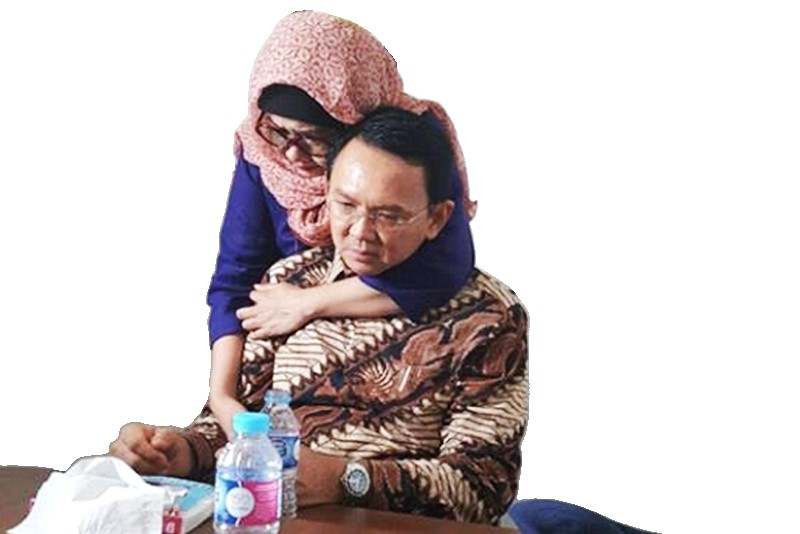Popular Reads
Top Results
Can't find what you're looking for?
View all search resultsPopular Reads
Top Results
Can't find what you're looking for?
View all search resultsTearful Ahok stays defiant
Change text size
Gift Premium Articles
to Anyone
I
n a case that has ignited fears of growing intolerance in the Muslim-majority nation, a tearful Jakarta governor gave a touching but at times defiant statement in his defense on Tuesday against allegations that he insulted the Quran.
At the start of his blasphemy trial at the former Central Jakarta District Court building, where hundreds of furious protesters flocked to demand his arrest, Jakarta Governor Basuki “Ahok” Tjahaja Purnama choked back tears as he strived to convince a panel of five judges that he had not intended to insult the holy book, an offense that carries a five-year prison term.
Ahok, the first Christian of Chinese descent to govern Jakarta, gave an emotionally charged narration of a loving relationship with his adoptive Muslim parents in his hometown in Bangka Belitung Islands.
“The accusation is the same as saying I insulted my adoptive parents and siblings,” said Ahok, who paused for a moment as one of his lawyers handed him a handkerchief.
“I was partly raised by my adoptive parents and their love profoundly remains in my heart. My first postgraduate tuition fee was even paid by my adoptive sister who is a Muslim.”
Ahok also told the judges of the many facilities he had provided for his Islamic constituents, including the construction of the first grand mosque belonging to the city and a swath of donations for religious schools and the celebration of Islamic days.
He also initiated the closure of the Kalijodo red-light area in West Jakarta, among the oldest in Southeast Asia, and Stadium nightclub in Central Jakarta, once an icon of the city’s underbelly that was notorious for drugs and prostitution.
Ahok, who is seeking reelection against two Muslim candidates in a poll on Feb. 15, sparked uproar among conservative Muslim groups in late September after he spoke to local residents and city officials in Thousand Islands about voting rights and cited Al-Maidah, verse 51 of the Quran.
The verse has often been used by politicians to deter Muslim voters from electing non-Muslims.
“My remark was intended to show that politicians often misuse the verse because they don’t want to compete in a fair manner in a regional election,” Ahok told the judges.
Although Ahok has repeatedly apologized for the remarks, the incident has sparked two large-scale rallies, each attended by more than 200,000 protesters on the streets of Central Jakarta. The rallies were the biggest public mobilization since the Reform Era in 1998.
Despite the touching statement, Ahok and his lawyers considered the trial to be politically motivated through the use of public pressure.
“This defense statement is titled ‘trial by the mob’,” said lawyer Trimoelja D. Soerjadi when reading a defense note.
“Indonesian citizens have witnessed public pressure in this case [as demonstrators] filled thoroughfares. This has led to the irregular acceleration of Ahok’s legal process,” said Trimoelja, referring to large-scale protests on Nov. 4 and Dec. 2 against Ahok over the allegations.
Trimoelja criticized the police’s swift action in investigating Ahok’s case. After naming him a suspect on Nov. 16, the police submitted Ahok’s case dossier to the Attorney General’s Office (AGO) on Nov. 25.
He highlighted that within three working days, the AGO declared Ahok’s 826-page dossier complete.
He also cited a statement from National Police chief Gen. Tito Karnavian in which he said the police had set aside a circular letter issued in 2015 that ordered personnel to postpone investigations into election candidates until the end of an election, to speed up the legal process against Ahok.
“It makes sense to assume that this public pressure aimed to remove Ahok from the election. This is a real threat to democracy in the country,” he said.
Outside the court building, protesters chanted at Ahok in what many deemed a display of pressure toward the judges.
“There is the blasphemer, arrest him immediately,” one protester said, provoking hundreds of others dressed in similar white attire to follow the chant, while police stood by.
Ahok was rushed away from the court in an armored police truck. The trial will resume on Dec. 20.










